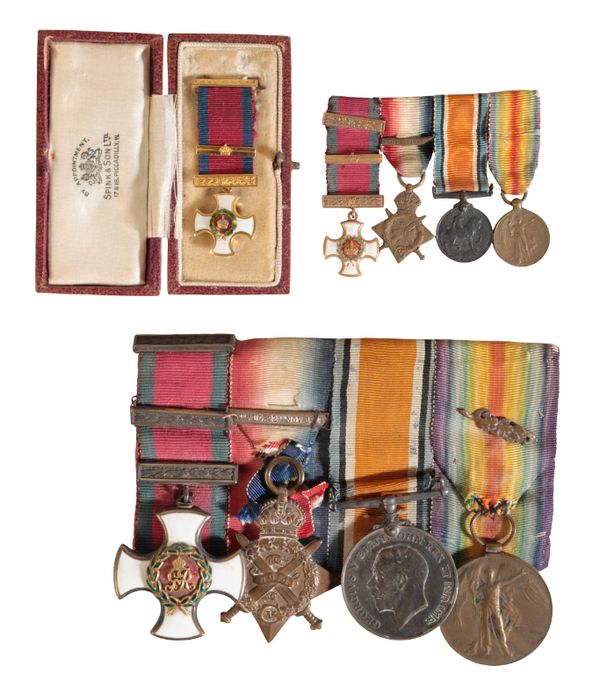to Sir Malby Richard Henry Crofton, Royal Field Artillery. The Bar was awarded for Gallantry.
G.V.R Distinguished Service Order and second award bar
1914 Star with clasp. Correctly impressed Capt Mr H Crofton RFA
British War Medal. Correctly impressed Lt Col M R H Crofton
Victory Medal with M.I.D. Oak Leaf. Correctly impressed Lt Col M R H Crofton
| Condition Report: | click here |
| Estimate: | £2,200 - £2,400 |
| Hammer price: | £2,800 |
Court mounted as worn. The 1914 Star is loose on the ribbon. With a corresponding miniature set.
Condition GVF.
Malby Richard Henry Crofton was born on the 18th of September 1881; his birth was registered in Dromore, Sligo, Ireland. He was the first son of Sir Malby Crofton, The 3rd Baronet of Longford House and his wife, Louisa Margaret Crofton, nee Verschoyle.
Crofton attended Sandhurst and was commissioned as a Second Lieutenant on the 18th of August 1900. He served with the Royal Artillery in 94 Battery between 1906 and 1909 as a Lieutenant.
Malby was part of the BEF landing on the Western Front in October 1914. He was transferred to Mesopotamia, and for services, there was awarded his First Distinguished Service Order, announced in the gazette on 22nd December 1916.
While serving with the of the 62nd West Riding Division Artillery, Crofton was awarded a Bar to his Distinguished Service Order as the Battery Commander of C/312.
'War Office, April 17th, 1917. His Majesty the KING has been graciously pleased to approve of the award of a Bar to the Distinguished Service Order to: —
*Maj. Malby Richard Henry Crofton, D.S.O., R.F.A. For conspicuous gallantry and devotion to duty. He went forward under the most intense- fire to a position 150 yards from the enemy's trenches, from where he controlled the fire of his battery with great skill. '
During the course of the war, Crofton was wounded four times and mentioned in despatches twice.
The following is an extract from the history of the 62nd:
Early on the morning of the 5th of April 1918, the 37th division carried out an attack on Rossignol Wood and a position running thence westwards, undercover of a barrage from the guns, which kept up from 5:30 AM to 7:30 AM. The enemy answered with a very heavy fire on all the batteries, especially on the headquarters of the right group at Chateau La Haie. Here the adjutant of the 235th brigade was wounded, and there were several casualties among the telephonists. About 130 prisoners were captured, including four officers. It soon appeared, however, that this local operation had merely forestalled another tremendous German attack, which reached its full force at about 10:45 AM and was kept up all through this on the following day. The Bosch bombardment was extraordinarily intense and stretched far into the back area. It included a large amount of gas shell, concentrated chiefly on the 312 Brigade, which was in action along a hedge close to and Southwest of Les Essarts. The brigade fought with magnificent courage; though inundated with gas shells the batteries never failed to fire when called upon throughout the day. Many men and officers were temporarily blinded by it.
C/312 Had a particularly terrible experience. All the six officers with guns, including Major Crofton, were wounded or gassed, and the majority of the gunners, while several guns, were knocked out. In fact, by the evening, the battery had ceased to exist as a fighting unit, and it was about a fortnight before it could take an active share again in the fighting. Much sympathy was felt for the gallant Battery Commander, Major Crofton. He had already been three or four times wounded during the war, and on this day, orders arrived appointing him to the command of a brigade, a promotion which he was unable to avail himself of owing to this fresh wound. It was particularly bad luck, as he had once before missed promotion in Mesopotamia for the same reason, having been badly wounded on a day on which he was appointed to a command'.
Crofton was promoted to Lieutenant Colonel, survived the war, and served in India as the Commanding Officer of 4th Battery 'Quetta' Royal Artillery. He became the 4th Baronet of Longford House when his father passed away in 1926.
Sir Malby Richard Henry Crofton passed away in 1962.
Condition GVF.

